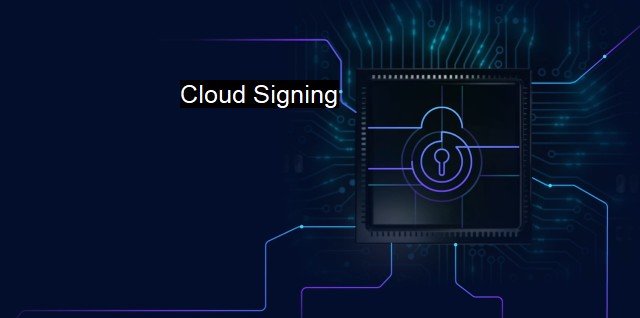What is Cloud Signing?
Revolutionizing Digital Security: Strengthening Measures with Cloud Signing Technology
"Cloud Signing" is a remarkable advance in the cybersecurity industry that is redefining how businesses are managing their antivirus and security operations. It accelerates digital transformation by offering harmonized security solutions across multiple platforms. This service broadly refers to the use of Cloud technology for digital signing – remote authentication of documents or software. Notable in the area of antivirus software, it offers real-time detection and responsiveness to cyber threats.Cloud Signing is a cornerstone digital strategy touted by leading tech ventures, aimed at streamlining security processes. To understand its practicability, it's essential first to appreciate its foundation: the traditional digital signing process used for verifying authenticity and data integrity. Users needed dedicated hardware with pre-loaded signing keys previously, but imagining having to manage such hardware for hundreds or thousands of users becomes realistic not much interesting.
Enter Cloud Signing. This technology, steeped in Cloud capabilities, morphs the shape of cybersecurity, solving a plethora of challenges in the management and deployment of antivirus solutions. Instead of the signature process happening locally on dedicated hardware, in Cloud Signing, the signing keys are securely hosted in hardware security modules (HSMs) on the Cloud, accessible remotely when needed.
From a simplistic perspective, what this means is that users or businesses can easily produce digital signatures for documents or cloud-based antivirus software, from any device, anywhere in the world, without the need for dedicated hardware or software.
Aside from its apparent convenience level, this technology plays a significant part in combating cybersecurity, notably in antivirus solutions. One ace up its sleeve is middle-ware assaults-attacks aimed at exploiting the third-party software that businesses often use. By moving the signing process into the Cloud, the potential for these assaults drops dramatically.
In terms of equipping antivirus solutions, Cloud Signing represents an attractive proposition. Antivirus software etched with these services reflects flexibility and broad coverage. It allows resources for detection of cyber threats to be run in the Cloud. This outsources many of the high-demand tasks associated with running an antivirus program, therefore, boosting response times considerably and enhancing system performance since

Cloud Signing FAQs
What is cloud signing in the context of cybersecurity and antivirus?
Cloud signing is a security technology that allows antivirus software to identify and verify the authenticity of files stored in the cloud. It involves digitally signing files and storing the signature in the cloud, so that when the file is accessed, the antivirus software can check the signature to ensure that the file has not been modified or tampered with.How does cloud signing help prevent cyber attacks?
Cloud signing helps prevent cyber attacks by ensuring the authenticity and integrity of files stored in the cloud. By verifying the digital signature of a file, antivirus software can detect if the file has been modified or corrupted, and can alert the user or block access to the file. This helps to prevent malware and other types of cyber attacks that rely on tampering with files in the cloud.What are some benefits of using cloud signing technology?
There are several benefits of using cloud signing technology for cybersecurity and antivirus protection. These include: increased security and protection against cyber attacks, improved detection and prevention of malware and other threats, enhanced visibility and control over files stored in the cloud, and simplified management and maintenance of antivirus software. Cloud signing also helps to ensure compliance with security policies and regulations.What are some common challenges of implementing cloud signing technology?
Some common challenges of implementing cloud signing technology include: the need for robust and reliable infrastructure to support the cloud signing process, the complexity and cost of managing digital certificates and signing keys, and the risk of security breaches or data loss if the cloud signing process is not properly secured. Additionally, some users may be hesitant to adopt cloud signing due to concerns about privacy and data security.| | A | | | B | | | C | | | D | | | E | | | F | | | G | | | H | | | I | | | J | | | K | | | L | | | M | |
| | N | | | O | | | P | | | Q | | | R | | | S | | | T | | | U | | | V | | | W | | | X | | | Y | | | Z | |
| | 1 | | | 2 | | | 3 | | | 4 | | | 7 | | | 8 | | |||||||